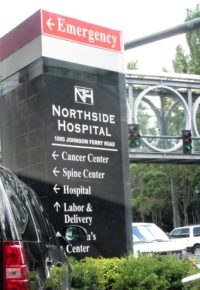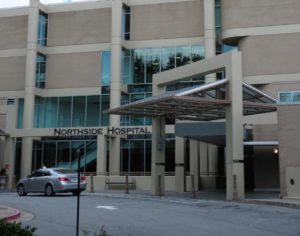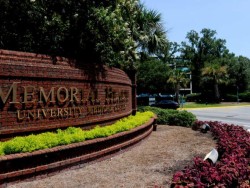A Georgia court case on public access to hospital records has sent tremors through legal circles, the state’s hospital industry and the media.
A major question is at stake: Does a nonprofit hospital have the right to reject requests for information about its financial documents and other matters?

So far, two Georgia courts say the answer is yes.
The Georgia Open Records Act, known as a “sunshine law,” was created to allow the people of the state to know what their government agencies are doing. Private citizens, lawyers and reporters routinely use the act to find out how agencies make decisions and spend money.
But Atlanta-based Northside Hospital Inc. says it’s not bound by that law. The hospital says it’s a private nonprofit corporation, not a public entity, so the open records law doesn’t apply to it.
Media organizations and others argue that Northside is subject to the open records law because it was created by a public hospital authority, which is indisputably a government entity, and that it operates solely on the authority’s behalf. They say all of Northside’s assets belong to its authority.
An attorney requesting records from Northside asked the state Supreme Court to hear the case after a recent appeals court ruling upholding the hospital’s position.
If the court decisions in favor of Northside are upheld, many large nonprofit hospitals can avoid public accountability, says David Hudson, an attorney whose firm is representing the Savannah Morning News and other media organizations.
“This is a big case for the right of the public to know what’s going on with public hospital systems,” Hudson says.
Not an unusual arrangement
The legal fight has serious implications for the whole Georgia hospital industry, because Northside’s corporate structure is like many others in the state.
Such a corporate structure starts with a local hospital authority. There are more than 80 hospital authorities across Georgia, They are created by cities or counties, or both, and their purpose is to build, equip and fund hospitals.

Many of these hospital authorities, for business purposes, have spun off their hospitals into separate nonprofit corporations over the past three decades. Under a spinoff arrangement, the hospital authority leases the assets of the hospital to the corporation.
These restructured hospitals include large urban facilities such as Grady in Atlanta, along with medical centers in Savannah, Augusta, Macon, Rome and Albany, as well as in the Atlanta suburbs.
Northside’s restructuring occurred in the early 1990s. It’s now an extremely successful hospital system, with more than $2 billion in revenues, and is set to add Gwinnett Medical Center, a large suburban system, to its fold. Northside has said for years that its flagship Atlanta hospital delivers more babies than any other community hospital in the nation.
The fight over Northside’s records and hospital privacy erupted in 2013, when an attorney requested information about Northside’s expenditures in the acquisitions of physicians’ practices. The hospital turned down the request. The plaintiff, attorney Kendrick Smith, a partner of the firm Jones Day, filed suit, and the case was first heard in Fulton County Superior Court.
Last year, the judge ruled in favor of Northside, saying that the hospital authority had nothing to do with the operations and acquisitions of the hospital.
Smith appealed. The court of appeals, in a split decision, upheld the lower court ruling.
Smith has appealed to the Georgia Supreme Court to hear the case. The Georgia Press Association, the First Amendment Foundation, the Savannah Morning News and the AJC have filed amicus briefs supporting the Smith appeal.
Smith, in legal documents, points to a Georgia court of appeals ruling in 1995 establishing that nonprofits carrying out the duties of a public hospital authority are subject to the Georgia Open Records Act.
Smith says the hospital authority and Northside Hospital are intertwined, including at the leadership level. Members of the Hospital Authority of Fulton County serve on Northside Hospital’s board, he says, while a number of authority officers serve as officers of Northside.

“All of Northside’s property and operations — all its assets and liabilities, however and whenever acquired, and, indeed, all its personnel — revert to the Authority upon termination of the lease,” Smith asserts. His attorney, Peter Canfield, adds that the authority has issued bonds to finance the growth of the Northside system.
Smith says the rulings in favor of Northside, if upheld, will give other organizations “a clear roadmap to removing their operations from the public eye.”
Northside spokesman Lee Echols says, “We understand and appreciate the interest in open records requests.’’
But he adds, “By law, we’re not a public entity that’s subject to” the Open Records Act.
The hospital authority “has had absolutely no role in business operations, patient care or acquisitions” of Northside Hospital, Echols says.

Echols says Smith, the plaintiff in the original records lawsuit against Northside, is connected to Emory Healthcare, a business competitor. (Attorney Canfield, representing Smith, declines to comment on that, saying public records are public for everybody so the records law does not require plaintiffs in records cases to identify their affiliations.)
Northside is protecting its business interests by denying the requests, Echols says. “If the decision is overturned, it’s certainly possible that other Georgia hospitals could be required to release sensitive business information when they’re not a public body.”
Echols acknowledges that Northside’s action on the records requests “doesn’t make everybody happy,’’ but he says the hospital’s stand is important to its business viability and operations.
Making legal history
The case is already being cited in legal and hospital circles.
The prominent law firm Alston & Bird said in an advisory, headlined “Georgia Hospitals Can Close the Door on Open Records Requests,” that under this majority decision, “documents in the possession of entities created through hospital authority restructurings may no longer be subject to the Act— in certain circumstances.”
In May, Savannah’s Memorial Health rejected a request from the Savannah Morning News for documents on the relationship between the health system’s CEO and a potential buyer, Novant Health. Memorial Health’s attorney cited the Smith v. Northside ruling in its reply.

Recently, Northside turned down AJC reporter Carrie Teegardin’s request for information related to compensation of its CEO, Robert Quattrocchi.
Teegardin says Northside, in a letter, said it would not provide the records because it is a nonprofit company and not a public agency whose records are subject to the Georgia Open Records Act.
Northside’s Echols says another reason the AJC’s request was turned down was because the newspaper has taken sides against the hospital by filing an amicus brief supporting the plaintiff in the Smith v. Northside case.
When GHN asked Echols if Northside would turn down a similar request from another media organization, he replied that the question would invite speculation, which he declined to do.
The State Attorney General’s office says it has no comment on Smith v. Northside, noting that it’s a matter of ongoing litigation.
The Georgia Supreme Court is expected to make a decision soon whether it will take up the Northside case.

